Value
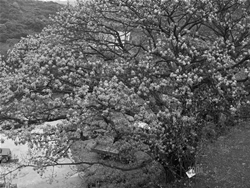
Establishing your life's goal, stepping forward steadily and firmly. This is the principle of living a healthy life. Paying close attention to your own growth, happily offering to serve others. This is the prescription for creating a happy life. Protecting the calmness and clarity of your mind, guarding your mind from the influence of the environment. These are the pillars of establishing a sound life. Making yourself healthy, happy, and sound, making others healthy, happy, and sound. This is where the value of Dharma Drum Mountainlies.
Methods for Calming the Mind
Face it, Accept it, Manage it, Let Go of It
Sipei
In 2002, sixth grader Yu Sipei represented Keelung Dongxin Elementary School in the National Table Tennis Championship Competition. Her performance was disappointing at first, as she fell behind early with no sign of improvement in the second half. Suddenly, later in the second half, her opponent's confidence was shaken by a mistake. Seeing this, Sipei counter-attacked with full force. To everyone's surprise, Sipei won the match and ultimately, the National Championship.
This sudden comeback created a great game for the audience but also confused them. It turned out that Sipei had practiced Chan meditation for more than a year, rarely missing the after-school classes offered by the Dharma Drum Mountain (DDM) Meditation Center. As a way to calm their minds, Sipei and her classmates practiced meditation under a Chan master's guidance once a week. Since then their teache2rs have marveled at how concentrated the students have been. After receiving the award, Sipei calmly shared her thoughts: "I just tried to play each and every serve well."
A-Shu
At age thirty, A-Shu left his job, returned to school, and started volunteering at non-profit organizations. With young people, changing jobs is not unusual, but A-Shu's serenity was a bit unexpected. Wasn't he concerned about his future, his life or his financial situation?
A-Shu said, "There are always occasional low periods in one's life, but I have a magic weapon ... after I started learning Buddhism, I was not afraid of anything." His eyes sparkled as he quoted Master Sheng Yen: "As long as you set goals for your life and make progress steadily, you will find your way." These words re-energized A-Shu as he shared his secret of fearlessness with us.
Hong Meiyu
Hong Meiyu has been the gardener at Nung Chan Monastery for more than ten years, often watering the flowers at sunset. She is the first to know when the light purple crambola will appear in early fall, when the white camellia will bloom, and definitely when the garden will be fragrant with osmanthus.
She said, "I started volunteering here more than ten years ago without knowing that this was a good way to practice." She had practiced Buddha's name recitation, which answered many questions, and Chan meditation retreats, which cured her leg problems. "I should have started practicing earlier," she said with a shy smile. Meiyu now practices regularly. Her volunteer jobs include watering the garden, operating the switchboard, and being a receptionist. She has been most helpful whenever a need arises. Her pleasant attitude and hard work have touched those who know her.
Step into a Wide Open Future
Many people look for ways to calm their minds. To Sipei, her opponent during the tournament is not the other player, not the final score, but each and every individual serve. To A-Shu, after establishing a new goal at the turning point in his life, his inner calmness helped him to face future without fear. To Meiyu the secret to a meaningful life is in practicing meditation and volunteering as a gardener at the monastery.
Viewing life from the perspective of Chan practice, Master Sheng Yen said, "The progress one can make in one's life is boundless." Return to the present. Live for the present. Don't dwell on the past. Don't dream too much of the future. Just step forward steadily and calmly. You will naturally step into a wide open future.
The Foundation of Happiness
Accomplish Other People, Develop Yourself
A common and touching scene during Chan pracitces at DDM is the many volunteers who come from all over to work for one to three, sometimes seven, or even forty-nine days. They are not there to take part in the retreats; they are "external aides," volunteers who do not even enter the Chan Hall.
A few years ago, a couple came back from abroad to work at a Chan Camp for Accomplished Professionals at DDM. This was the first time that this 50-something couple worked on exactly the same chores every day from morning to night. They worked with full enjoyment simply because they were able to offer something to others.
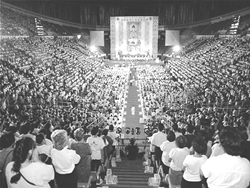
For three days, the husband worked on preparing vegetables in the kitchen and the wife cleaned the bathrooms. To scrub the floor thoroughly she had to bend really low, and a mishap caused her eyeglasses to fall and break into pieces. She just looked at the shattered glasses and smiled calmly. The couple traveled thousands of miles to volunteer because other volunteers had helped them when they were on/in retreat themselves. People volunteer because they feel grateful for the deeds of others that have touched them, and also because they have a passion for the work.
Hong Mulin
For Hong Mulin, a meditation group leader in Beitou, Taipei, beginning Chan practice led him into a new phase of his life. Volunteering has become one of the roles in which he has excelled. Many years of experience as an external aide have taught him much about maintaining the dorms, clapping the boards to make announcements, taking care of the incense, providing tea, and coordinating emergency help. He said it is best to have experienced volunteers clap the boards as it controls the timing of all the activities. Those responsible for guarding the monastery not only care for the students, but also serve as the main contact to the head Dharma teacher.
Hong Mulin keeps notes on all that he has learned from volunteering over the years. Each page vividly portrays the same common theme: being an all-round volunteer. He vowed that he would not only work as an external aide, but that he would also be involved with every aspect of propagating DDM, including sharing its philosophy, guiding tours of the buildings, consulting about Buddhadharma, and introducing basic meditation practice. If you were to ask him why he is so involved, his answer would be "because I do not want to abandon anyone who has their heart set on learning Buddhism."
The Secret to Enriching Life
Buddhists who live abroad have also demonstrated great passion for volunteering. A-liu, a Singaporean, is an executive at a local bank. His admiration for Master Sheng Yen came from reading the Master's books in English, as A-liu does not know Chinese very well. A few years ago, A-liu volunteered for the DDM booth at a Book Fair in Singapore. That pleasant experience prompted him to work on his Chinese and made him a long time volunteer at the Book Fair.
Book fairs in Singapore, in contrast to those in Taipei, attract more people at night and remain open until midnight. After A-liu wraps up his volunteer work at the Book Fair, he rushes back to his "real job" of doing banking business with New York. To be on duty nights and days is of course tiring for A-liu, but his joy in volunteering never dies out, because master Shen Yen's books have inspired him to ponder seriously over the meaning of life. "There should be more to life than work," he said.
The Power of Being Touched
Being Grateful, Repaying Kindness: This Is First
Due to the combined efforts of several Buddhist groups, Buddhism has received considerable attention in Taiwan during recent decades. Resources are readily available for anyone who wants to know more about Buddhism. Nung Chan Monastery is a well-known religious center in the Greater Taipei metropolitan area. On weekends, when Nung Chan Monastery holds Chan meditation, assemblies, or workshops, its neighboring streets are filled with crowds. Guided by volunteers, visitors calmly and orderly proceed into the pleasant and clean small alley where the monastery is situated.
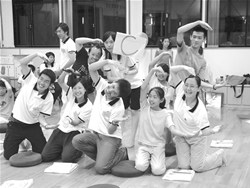
Chen Jianan, president of the Dharma Drum General Association of the Dharma Upholders, points out that a DDM follower walks on a broad path to learn, protect, and promote Buddhadharma, which he believes should be integrated into everyday life. Only when our body, speech, and mind act in accordance with Buddhadharma will we function with a grateful heart in dealing with others. Chen further explains that this transformation into a grateful heart begins with the "self" and then radiates out to people around you. This gratitude, as expressed The Common Endeavor of Buddhists, emanates spontaneously from one's heart: "Being grateful, repaying kindness: this is first."
The Common Endeavor of Buddhists
Have faith in Buddha; follow the Dharma; respect the Sangha.
The Three Jewels are a bright shining throughout eternity.
Uplift the character of humanity
And build a pure land on earth.
Being grateful, repaying kindness: this is dfirst;
Benefit others and you benefit yourself.
Foremost is to exert your wholehearted effort
Without meansuring more or less.
Kindness and compassion have no enemies,
And wisdom engenders no vexations.
The busy make the most of time;
The diligent enjoy the best of health.
In broadly sowing the fields of merit,
Why fear any hardship and rebuke?
Those who give selflessly are blessed;
Those who do good deeds are happy.
In every moment feel the joy of the Dharma,
And abide in the bliss of meditation.
Recite "Guanyin Bodhisattva" everywhere
And chant "Amitabha Buddha" without end.
The Common Endeavor of Buddhists are easy to understand as they are written in everyday language. Nevertheless they are very rich in meaning as they simultaneously incorporate the building of confidence, the ideas behind DDM, the methods of practice, and the very essence of Buddhism: contribution, gratitude, generosity and diligence.
Chen Shufen, a show husiness veteran, learned a great deal from The Common Endeavor of Buddhists. She said, "These are not just slogans; they are realized through practice. All of them can be put into practice and are ordered according to the sequence of practice ... After you gain confidence you will appreciate what you have received. This in turn will lead to actions as a way to return your gratitude."
Appreciation comes from learning Buddhadharma: you realize that your growth benefits from all that surrounds you. This simultaneously generates the desire to do something in return. Reciprocity is not limited to a special person but expands to a much broader scope.
Because you are grateful, you will try your very best without complaint. You will willingly bear the burdens of helping other people to achieve their aims. You heart is filled with joy as you are generous in giving.
These twenty principles/The Common Endeavor of Buddhists have/has been the true essence for all DDM followers.
Cheering Humanity On
Build a Pure Land on Earth
Stepping into a subway station in Taipei, people subconsciously walk at a faster pace, passing other people just to get to their destinations faster. All of a sudden you notice an advertisement portraying a completely different environment: a group of small boys racing to the ocean. You can imagine them leaping into the ocean under the bright sun, yelling in a high pitch, "one, two, three, jump!" Next to this summer scene portraying childhood, are the words: "Cheering Humanity On."
Your eyes are attracted to another scene of a playground next to a park under a blue sky. There are several huge goldenrain trees in the park. In autumn, yellow flowers hang on the trees; when it turns cold, their colors change to light orange to welcome the end of the year. Right there, you would see another advertisement: a smiling old lady, handing a picture in front of your eyes, waiting for your response. "Cheering Humanity On" are the only words in the picture.
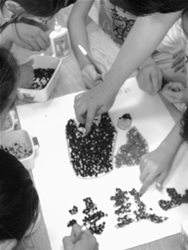
This set of Cheering Humanity On advertisements are meant to promote DDM's Fivefold Spiritual Renaissance Campaign:
1. Four fields for Cultivating Peace
2. Four Guidelines for Dealing with Desires
3. Four Steps for Handling a Problem
4. Four Practices for Helping Oneself and Others
5. Four Ways to Cultivate Blessings
The Fivefold Spiritual Renaissance Campaign has been understood as "New Life Advocates in the 21st Century."
Ven. Guozao, a top executive in the DDM Foundation, explains the two levels for DDM's Protecting the Spiritual Environment: one is to protect your heart against impurities; the other is to use Buddhadharma to purify your mind when vexations arise. Both the Fivefold Spiritual Renaissance Campaign and of the Common Endeavor of Buddhists offer prescriptions to prevent and resolve one's vexations.
Health Exercise to Protect the Spiritual Environment
In the 21st century, Buddhism is a teaching that is open to all, but people's minds are unavoidably trapped in turmoil and disorder because of advanced technology and rampant materialism. The needs of the era in which we live as well as the desires of the human heart, both drive mankind to seek values of the inner heart and yearn for ways to handle vexations.
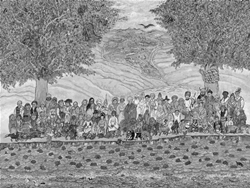
Situated in Jinshan, Taipei County, DDM is dedicated to protecting the spiritual environment. However, even if one cannot visit DDM's Buddhism Center, one can still practice the concepts and methods in their daily lives.
Master Sheng Yen often says:
To protect the spiritual environmental means making yourself and others happy, making yourself and others healthy, and making yourself and others safe.
So that all people may attain happiness, health, and safety, DDM proposes three approaches: (1) the Four Kinds of Environmentalism, (2) the Fivefold Spiritual Renaissance Campaign, and (3) The Common Endeavor of Buddhists.
Therefore, whether you are a member or just a visitor to DDM, as long as you apply the concepts and methods suggested by Master Sheng Yen in your daily life, you are protecting the spiritual environmental and helping to build a pure land on earth.